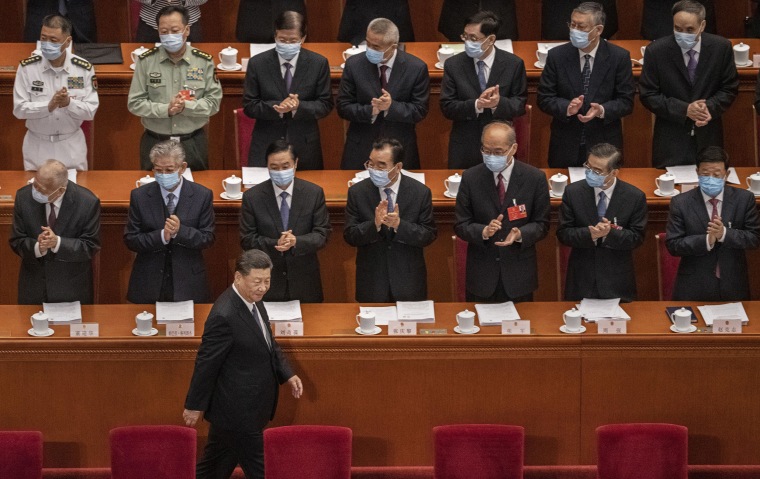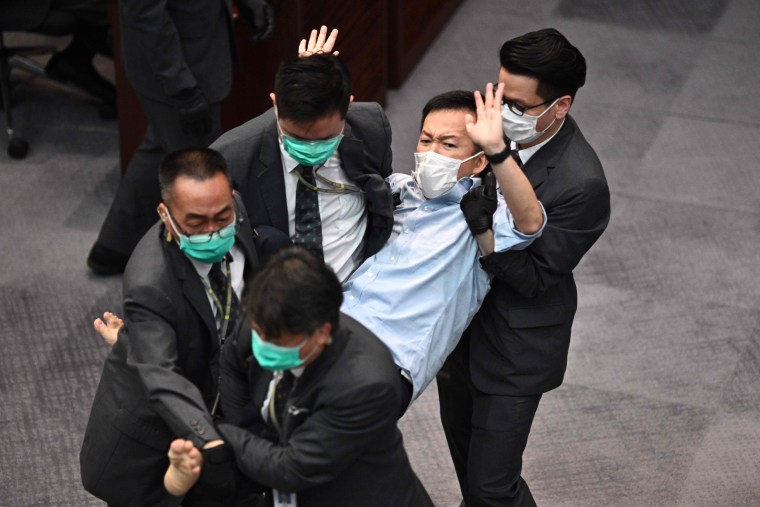HONG KONG — Pro-democracy legislators in Hong Kong on Friday hit back after Beijing introduced a new national security law that could limit protests and dramatically reduce the territory's autonomy.
"This is the end of Hong Kong and it’s like the end of our homeland," Tanya Chan, a member of Hong Kong's Legislative Council, said at the start of China's annual National People's Congress in Beijing, where the bill was set to be discussed.
"I recall the time when I was young, and I believed in 'one country, two systems,' and I believed we were going to showcase to the world that Hong Kong people can rule Hong Kong," she added. "But now, I'm not yet 50 years old and suddenly all is gone."
Fellow lawmaker and chairman of Hong Kong’s Democratic party, Wu Chi-wai, also told NBC News: "The rule of law in Hong Kong is over, because of the implementation of the national security ordinance."
The territory was handed to China after British colonial rule ended in 1997 and has been governed by a unique model aimed at guaranteeing freedoms not granted on the mainland.
China's National People's Congress — the country's annual grand political convention where major policy is passed by the ruling Communist Party — announced on Thursday it would deliberate a bill on "establishing and improving the legal system and enforcement mechanisms" for Hong Kong in order to "safeguard national security."
The bill would allow China to sidestep the territory's own legislative body to crack down on activity Beijing considers subversive and represented a major turning point. It is widely expected to pass.
Hong Kong's Chief Executive Carrie Lam, currently in Beijing for the annual congress, told reporters on Friday that she supported the bill that would safeguard security and was in the interests of all Hong Kong residents.
Lam said violence and disturbances had escalated in the last year "seriously jeopardizing public safety," and added that investors would also be pleased by a stabilized environment.
"There is now another way of ensuring that Hong Kong will have the necessary legislation and the safeguards in place for national security," she told reporters. "This is really the time for us not to waste any more time and to get on with these important legislative safeguards."
Last year, Hong Kong erupted with paralyzing protests as demonstrators challenged a separate bill that would have allowed residents to be extradited to China. Although that bill was shelved, the demonstrations morphed into a wider movement against the erosion of civil liberties.
As scuffles broke out once again among lawmakers in Hong Kong's divided parliament, Joshua Wong, a popular leader of the territory's pro-democracy movement, warned online that it was "foreseeable" that people would be "prepared to fight to protect our vanishing freedoms."
Wong said the proposed law would "kill future democratic movements" if passed, and feared it could lead to a new Beijing-led national security agency on the ground enforcing the law in the territory.
Beijing has not yet outlined the practical implementation of the law.

Hong Kong is a flashpoint for U.S.-China relations.
Growing critic of China, Secretary of State Mike Pompeo, condemned the decision on Friday as unilateral and arbitrary.
"The United States condemns the PRC proposal to impose national security legislation on Hong Kong and strongly urges Beijing to reconsider," he tweeted. "We stand with the people of Hong Kong."
Earlier this month he said the U.S. would delay a report assessing whether Hong Kong was sufficiently autonomous from China to warrant Washington’s special economic treatment.
"Any effort to impose national security legislation that does not reflect the will of the people of Hong Kong would be highly destabilizing," Minister Counselor for Public Affairs at the U.S. Embassy Beijing, Frank J Whitaker, also told NBC News.
Washington has also been making louder noise over its support of democratic Taiwan, including a potential $180 million arms sale announced this week, angering China, in a growing war of words that some have described as a new Cold War.
The dropping of the word "peaceful", in a standard expression Chinese leaders use to refer to China's relations with Taiwan, during the opening speech of Premier Li Keqiang on Friday, also raised some eyebrows among China watchers.

To attend the NPC meeting, some 3,000 party delegates, officials and media had to undertake coronavirus tests and be sequestered in hotels. In Beijing's opulent Great Hall of the People — built under Mao Zedong — everyone apart from Xi Jinping and senior cadres donned protective face-masks.
Although leaders struck a confident note and tried to maintain a business as usual agenda in the face of the global pandemic, the atmosphere was somewhat diminished with less pomp. A minute's silence was also observed to pay respects to those killed by the virus — some 4,600 people in China, according to official data.
Premier Li, in a shorter address than previous years, said that for the first time in recent history China would not be announcing a gross domestic product (GDP) growth target for 2020, as a result of the turbulent economic times due to the pandemic. The figure is normally a highlight of the political convention.
The world's second largest economy also announced a slight rise in defense spending of 6.6 percent from 2019 but still the slowest rate in three decades.
The figure, set at 1.268 trillion yuan ($178.16 billion) in the national budget, is closely watched as a barometer of how aggressively the country will beef up its military. China, increasingly active in the South China Sea and around the straits of Taiwan, gives only a raw figure for military expenditure, with no breakdown.
Its reported defense budget for 2020 is about a quarter of the U.S. defense budget last year, which stood at $686 billion.
Tesa Arcilla and Justin Solomon reported from Hong Kong. Janis Mackey Frayer reported from Beijing and Adela Suliman reported from London.
Reuters contributed to this report.

